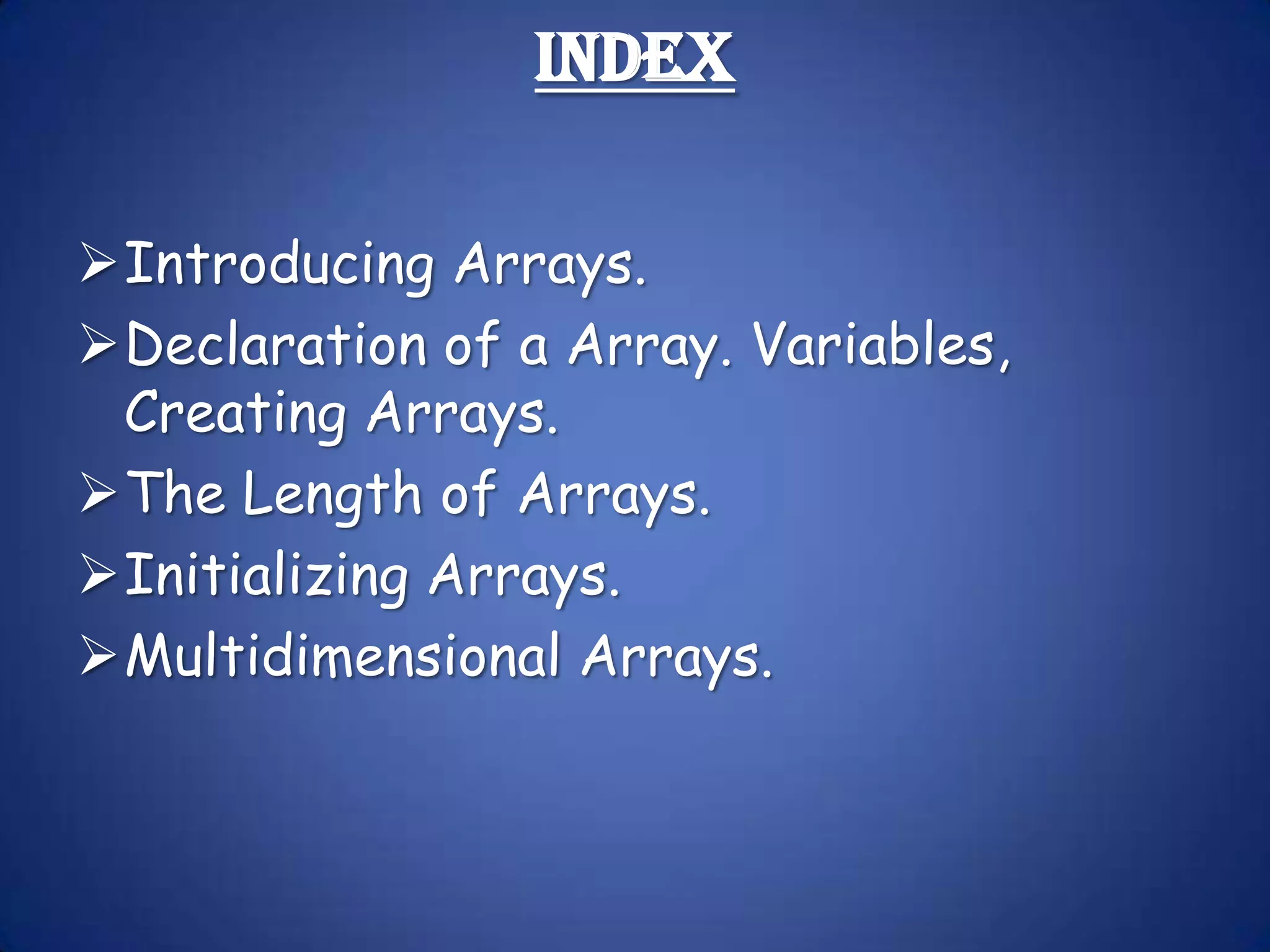The document discusses arrays in C language. It defines an array as a data structure that stores a collection of similar data types. An array is declared by specifying the data type, array name, and size/number of elements. Once declared, an array's size cannot be changed. Elements can be accessed via their index. Multidimensional arrays store elements in multiple dimensions and are accessed using two or more indices.


![Introducing Arrays Array is a data structure that represents a collection of the same types of data. int num[10]; Num reference num [0] num[1] num[2] num [3] An Array of 10 Elements num[4] of type int. num[5] num[6] num[7] num[8] num[9]](https://image.slidesharecdn.com/arrayinclanguage-121007071745-phpapp01/75/Array-in-c-language-3-2048.jpg)
![Declaring Array Variables Data type array name[index]; Example: int list[10]; char num[15]; float hat[20];](https://image.slidesharecdn.com/arrayinclanguage-121007071745-phpapp01/75/Array-in-c-language-4-2048.jpg)
![Creating Arrays Data type array-name[size]; Example: int num[10]; num[0]references the first element in the array. num[9]references the last element in the array.](https://image.slidesharecdn.com/arrayinclanguage-121007071745-phpapp01/75/Array-in-c-language-5-2048.jpg)
![The Length of Arrays Once an array is created, its size is fixed. It cannot be changed. For Example, int arr[10]; You can not insert any number to arr[11] location because it is not initialized.](https://image.slidesharecdn.com/arrayinclanguage-121007071745-phpapp01/75/Array-in-c-language-6-2048.jpg)
![Initializing Arrays Declaring, creating, initializing in one step: int my Array[5] = {1, 2, 3, 4, 5}; int studentAge[4]; studentAge[0] = 14; studentAge[1] = 13; studentAge[2] = 15; studentAge[3] = 16;](https://image.slidesharecdn.com/arrayinclanguage-121007071745-phpapp01/75/Array-in-c-language-7-2048.jpg)
![Multidimensional Arrays int matrix[10] [10]; for (i=0; i<10; i++) for (j=0; j<10; j++) { matrix[i] [j] = i * j; } float mat[5] [5];](https://image.slidesharecdn.com/arrayinclanguage-121007071745-phpapp01/75/Array-in-c-language-8-2048.jpg)
![Multidimensional Array Illustration 0 1 2 3 4 0 1 2 3 4 0 1 2 0 0 0 1 2 3 1 1 1 4 5 6 2 2 7 2 7 8 9 3 3 3 10 11 12 4 4 int matrix[5] [5]; int[][] array ={ matrix[2] [1] = 7 {1, 2, 3}, {4, 5, 6}, {7, 8, 9}, {10, 11, 12}};](https://image.slidesharecdn.com/arrayinclanguage-121007071745-phpapp01/75/Array-in-c-language-9-2048.jpg)
![Initializing of Multidimensional Arrays To declare, create and initialize a multidimensional array. For example, int[][] array = { {1, 2, 3}, {4, 5, 6}, {7, 8, 9}, {10, 11, 12} }; This is equivalent to the following statements: array[0][0] = 1; array[0][1] = 2; array[0][2] = 3; array[1][0] = 4; array[1][1] = 5; array[1][2] = 6; array[2][0] = 7; array[2][1] = 8; array[2][2] = 9; array[3][0] = 10; array[3][1] = 11; array[3][2] = 12;](https://image.slidesharecdn.com/arrayinclanguage-121007071745-phpapp01/75/Array-in-c-language-10-2048.jpg)